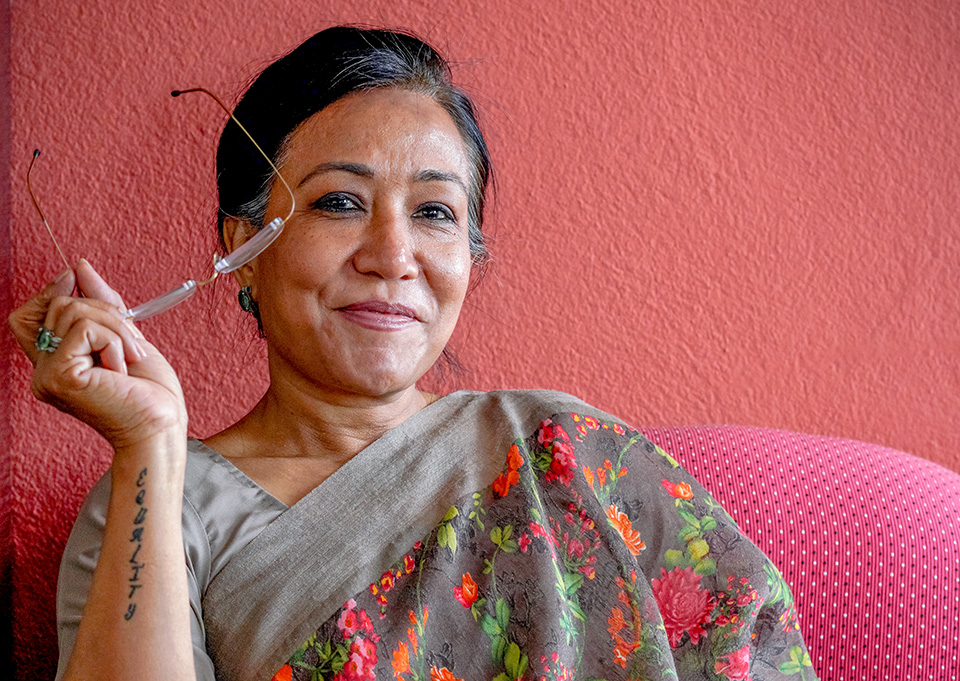Take Five: “A woman with a degree in law not only empowers herself but also society.”
Date:
Authors: Ashma Shrestha and Subha Ghale

Honourable Sapana Pradhan Malla is a Supreme Court Justice of Nepal and a former member of the Constituent Assembly and the Committee Against Torture. A champion of women’s rights, she has been instrumental in decriminalizing abortion, criminalizing marital rape, and securing women’s rights to inheritance and reproductive rights. She was interviewed in Kathmandu in December 2019.
The representation of women in Nepal’s judiciary is gradually increasing. You are a role model to many young women. What is your message to young women aspiring to join the judiciary?
A woman with the degree in law not only empowers herself but also the society. Women experience distinct forms of injustice and discrimination. Denial of rights can have a disproportionate effect on them. Young women can fight such injustices through the legal profession. Women make up over 70 per cent of students in law schools in Nepal. Now is the time to create and sustain a space for them in the justice sector.
The Supreme Court recently sentenced two rapists of a minor to 11½ years in jail and ordered that the girl be provided with compensation of NPR 1 million (about USD 8,850), considering the physical and mental harm inflicted on her. What is the significance of the verdict in addressing the culture of rape in our society?
There is a culture of victim-blaming in our society. People have resistance to understanding what rape means, and its lasting consequences. The recent verdict of the Supreme Court has not only recognized rape as a crime against the state but also an individual. Rape is not just an act of physical and sexual violence; it also has long-term effects on the victim’s mental and social well-being. In terms of compensation, not only the perpetrator but also the State has to take responsibility to repair the harm and build institutional mechanisms to mobilize funds and resources to support the survivors. Just because the investigation and prosecution fails to establish the harm experienced by the survivor, or the perpetrator is poor -- these should not be barriers to delivering compensatory justice. The verdict marked a paradigm shift from a crime-fighting approach to a restorative justice approach.
Women experience multiple vulnerabilities that impede their access to justice. What has the judiciary done about this?
Women face many barriers in accessing justice: financial constraints, fear of re-victimization by the perpetrators, stigmatization, fear of bringing dishonour to the family, lengthy and complex court procedures, lack of knowledge about legal remedies, geographical remoteness, language barriers, and weak legal representation. Women also are more vulnerable to sexual violence and discrimination due to caste, ethnicity, geographic location, disability, sexual orientation, marital status and age. All this needs to be taken into account when creating policies for justice.
Our society needs to understand the concept of “consent”. Consent provided once cannot be taken as consent forever. Free consent cannot be established if there is an unequal power relation between the victim and the perpetrator. Survivors of sexual violence are often blamed with statements like, “She was bargaining for money,” or “That can’t be true as the accused man is from a good background.” The victim and her family often face hostility from the perpetrators and are forced to change their statements by the time they reach the court. This hostility needs to be addressed, and safety, economic opportunities and shelter need to be provided to the victims.
This year marks the 25th Anniversary of the Beijing Platform for Action. What needs to be done in Nepal to achieve gender equality?
Since the 1995 Beijing Conference, much has been achieved in creating laws to protect women’s rights in political representation, security from violence, inheritance, reproductive health. But larger structural barriers to women’s rights are nonetheless growing; for that, we need to create effective institutions and allocate adequate resources for women to realize their rights. We need to listen to the voices of women and young girls marching in streets and demanding their rights. It is time to march with them and be loud and clear that women are equal but different. The different needs of women, in the public but also in the private sphere, must be addressed. We still need to send the message that women’s rights is at the centre of human rights.
The Access to Justice Commission under the Supreme Court was established recently. What is it doing to advance the rights of women and marginalized groups?
The Commission empowers the chain of justice and communicates with state agencies about the obstacles to justice and what improvements are required. To remove major barriers that women face in accessing justice, we are creating a women-friendly court environment with witness and victim protection mechanisms, dignified behaviour toward women, and quality representation.